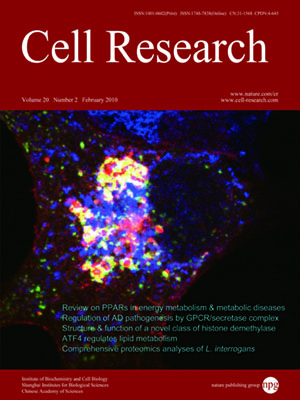
Volume 20, No 2, Feb 2010
ISSN: 1001-0602
EISSN: 1748-7838 2018
impact factor 17.848*
(Clarivate Analytics, 2019)
Volume 20 Issue 2, February 2010: 138-153
ORIGINAL ARTICLES
A GPCR/secretase complex regulates β- and γ-secretase specificity for Aβ production and contributes to AD pathogenesis
Lin Teng1, Jian Zhao1, Feifei Wang2, Lan Ma2 and Gang Pei1,3
1Laboratory of Molecular Cell Biology, Institute of Biochemistry and Cell Biology, Shanghai Institutes for Biological Sciences, Chinese Academy of Sciences; Graduate School of the Chinese Academy of Sciences, Shanghai 200031, China
2Pharmacology Research Center, Shanghai Medical School, Fudan University, Shanghai 200032, China
3School of Life Science and Technology, Tongji University, Shanghai 200092, China
Correspondence: Gang Pei, Jian Zhao,(gpei@sibs.ac.cn; jzhao@sibs.ac.cn)
Dysregulation of β-site APP-cleaving enzyme (BACE) and/or γ-secretase leads to anomalous production of amyloid-β peptide (Aβ) and contributes to the etiology of Alzheimer's disease (AD). Since these secretases mediate proteolytic processing of numerous proteins, little success has been achieved to treat AD by secretase inhibitors because of inevitable undesired side effects. Thus, it is of importance to unravel the regulatory mechanisms of these secretases. Here, we show that δ-opioid receptor (DOR) promotes the processing of Aβ precursor protein (APP) by BACE1 and γ-secretase, but not that of Notch, N-cadherin or APLP. Further investigation reveals that DOR forms a complex with BACE1 and γ-secretase, and activation of DOR mediates the co-endocytic sorting of the secretases/receptor complex for APP endoproteolysis. Dysfunction of the receptor retards the endocytosis of BACE1 and γ-secretase and thus the production of Aβ. Consistently, knockdown or antagonization of DOR reduces secretase activities and ameliorates Aβ pathology and Aβ-dependent behavioral deficits, but does not affect the processing of Notch, N-cadherin or APLP in AD model mice. Our study not only uncovers a molecular mechanism for the formation of a DOR/secretase complex that regulates the specificity of secretase for Aβ production but also suggests that intervention of either formation or trafficking of the GPCR/secretase complex could lead to a new strategy against AD, potentially with fewer side effects.
Cell Research (2010) 20:138-153. doi: 10.1038/cr.2010.3; published online 12 January 2010
FULL TEXT | PDF
Browse 2269


